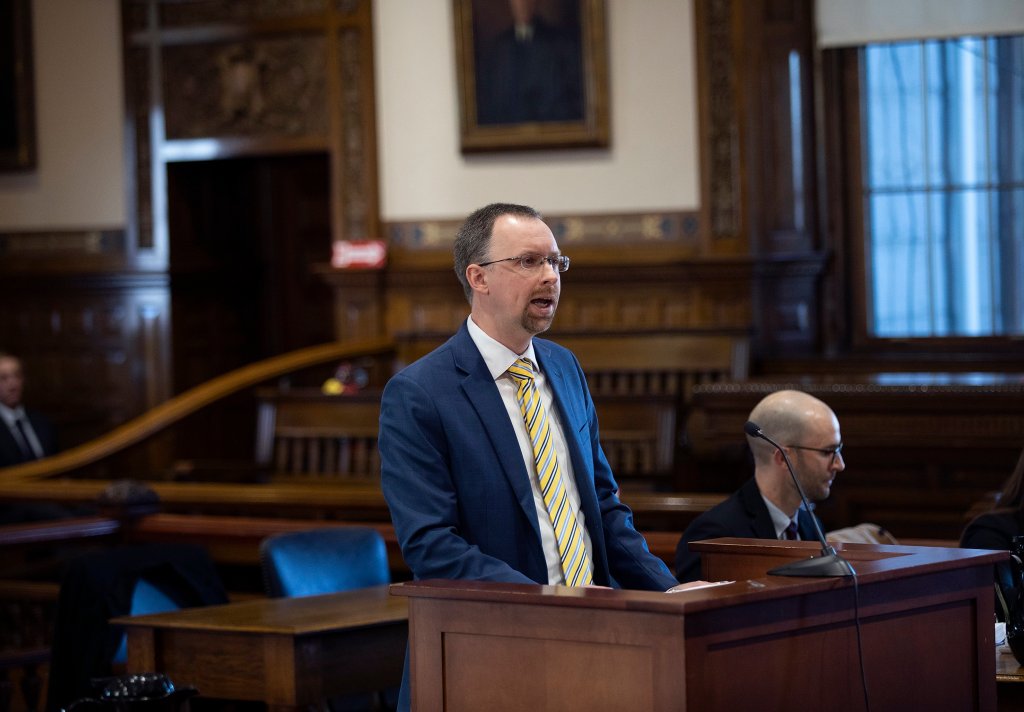
The Senate confirmed a Maine attorney’s nomination to the 1st U.S. Circuit Court of Appeals on Tuesday, in a party-line vote that divided Maine’s two senators.
Joshua Dunlap lives in Scarborough and is a partner at Pierce Atwood in Portland, where he works on civil litigation and appeals, according to the firm’s website. He grew up in Vassalboro.
Dunlap was nominated by President Donald Trump in July, with support from Sen. Susan Collins, R-Maine, who has called Dunlap an “attorney of extraordinary intelligence, extensive experience, and demonstrated integrity.”
It was unclear Tuesday afternoon when Dunlap will be sworn in.
He was confirmed as the government has been shut down for more than a month. Senators voted on Thursday to limit debate during Dunlap’s judicial confirmation hearing Tuesday.
Dunlap’s nomination has been met with both support and opposition. Jim Erwin, a retired former partner at Pierce Atwood, wrote in a letter to the Portland Press Herald on Friday that Dunlap’s appointment is being exploited in a “hyper-partisan climate.”
Several advocacy groups for LGBTQ rights, abortion and voting access criticized Dunlap’s nomination in September, arguing that some of his previous statements appear to be biased against their causes. Dunlap has represented political clients in various high-profile lawsuits, including recent cases challenging campaign finance laws and the state’s “right to repair law,” both of which were approved by citizens’ referendums. Dunlap also represented the state’s Government Oversight Committee in 2023, when members were trying to enforce a subpoena for child protective records.
Dunlap received a favorable recommendation from a committee for the American Bar Association and Collins said she received letters from attorneys “representing a broad spectrum of political views” who have praised Dunlap’s legal experience.
Sen. Angus King, an independent who caucuses with Democrats, voted against confirming Dunlap on Tuesday. He said he reached his decision after reviewing Dunlap’s nomination materials and conducting an interview with him.
“I was left with the strong impression that he would come at the job with an ideological bias, not the objective neutrality which should be the defining judicial standard,” King said in a written statement provided by his office.
Dunlap could not be immediately reached for comment Tuesday.
King said he was concerned by how Dunlap answered questions during a Senate committee hearing. Dunlap also answered these questions and others in a 60-page application now available on the Senate’s website.
During the hearing, Dunlap was asked about testimony he submitted to state lawmakers in 2015, supporting proposed legislation, which later failed, that would have required parents to consent to a minor’s abortion, and a letter to the editor published in the Scarborough Leader in 2012, decrying the theft of several yard signs expressing opposition to a ballot initiative to legalize gay marriage.
Dunlap told the committee his views would not be relevant to his position on the 1st Circuit.
“I would faithfully apply binding precedent, as well as any laws I was required to interpret,” Dunlap testified on July 30.
King stated Dunlap’s responses were “consistently vague and not very reassuring,” and added that “his past associations suggest an unduly narrow approach to interpreting the law, particularly in the area of individual rights, coupled with hostility to women’s reproductive rights and marriage equality.”
Staff writer Drew Johnson contributed to this report.
This story was updated Nov. 5 to correct Jim Erwin’s position with Pierce Atwood.
